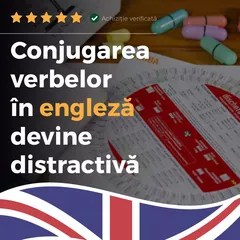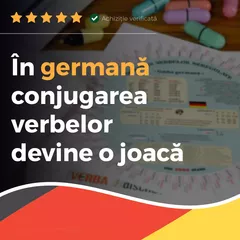Salutare, dear english student.
Eu sunt Laura și te voi însoți în călătoria ta spre un nivel cât mai avansat al limbii engleze.
Timpurile verbelor în engleză nu sunt așa de dificil de reținut sau greu de înțeles, dacă ai toate informațiile centralizate și bine explicate. Pentru că mulți prieteni ai editurii noastre s-au plâns că nu înțeleg foarte bine modul de utilizare al timpurilor verbale în limba engleză sau că nu pot reține modul de formare al acestora, am hotărât să scriem un articol complex în care să explicăm pe larg toate acestea. Citește articolul dacă vrei să poți reține și să poți înțelege ușor și rapid timpurile verbelor în engleză.
În plus, la final ți-am pregătit câteva sfaturi utile despre cum să înveți formele verbelor neregulate în limba engleză simplu și rapid. Așadar, citește articolul până la final.
Iată care sunt timpurile verbelor în engleză:
- Present Simple
- Present Continuous
- Present Perfect
- Present Perfect Continuous
- Past Simple
- Past Continuous
- Past Perfect
- Past Perfect Continuous
- Future Simple
- Future Continuous
- Future Perfect
- Future Perfect Continuous
Înainte de a trece efectiv la fiecare timp în parte aș vrea să remarci un lucru. Fiecare timp (prezent, trecut și viitor) are 3 aspecte: Simplu, Continuu (progresiv) și Perfect. Ce înseamnă acest lucru? În română nu avem echivalent direct pentru aceste timpuri, nu-i așa?
Ca să-ți fie mai simplu de înțeles timpurile verbale în engleză reține următoarele lucruri:
Aspectul Simplu - acțiunea este generală
Aspectul simplu ne arată mereu că acțiunea e simplă, nu are nimic particular, nici nu e în desfășurare, nici nu e legată de alte acțiuni.
Prezent Simplu - I always go to school in time.
Trecut Simplu - I played tennis last year.
Viitor Simplu - I shall visit Paris next week.
Aspectul Continuu (progresiv) - acțiunea este în derulare
Când acțiunea se află în derulare, în progres la un anumit moment atunci folosim aspectul progresiv.
Aspectul progresiv ne arată mereu că acțiunea este în progres, că îi ia ceva timp să se desfășoare, ea e continuă pentru un anumit interval de timp.
Prezent Continuu - I am going to school now.
Trecut Continuu - They were playing, talking and laughing during the class.
Viitor Continuu - He will not be living here next year.
Aspectul Perfect - acțiunea are legătură cu o altă acțiune
Când acțiunea se află în legătură cu o altă acțiune sau timp, folosim mereu aspectul perfect.
Aspectul perfect ne arată mereu o legătură cu ceva, acțiunea nu e izolată, e mereu legată de altă acțiune sau alt timp, dar niciodată nu e singură.
Prezent Perfect - I have not drunk coffee today, and now I’m sleepy.
Trecut Perfect - I had not drunk coffee yesterday, so I was sleepy the whole day.
Viitor Perfect - I WILL not HAVE DRUNK coffee (tomorrow, before you wake up).
După ce am lămurit care e treaba cu aceste aspecte ale timpurilor verbale, haide să trecem direct la modul de formare și utilizarea timpurilor verbelor în engleză. Nu uita că la final ți-am pregătit un tip pentru a reține mai ușor formele neregulate ale verbelor.
Present Simple
Prezentul simplu (numit și prezent nedefinit) este un timp verbal care este folosit pentru a arăta repetarea, obișnuința sau generalizarea. Mai rar, prezentul simplu poate fi folosit pentru a vorbi despre acțiuni programate în viitorul apropiat și, în unele cazuri, acțiuni care se întâmplă acum.
Formare:
Afirmativ: S + verb + (s, es la persoana a III-a, singular)
Negativ: S + don't/doesn't + verb
Interogativ: Do/Does + S + verb
Când se utilizează:
- acțiuni obișnuite, care se întâmplă în mod regulat, dar nu neapărat în momentul vorbirii;
The train leaves every morning at 8 AM.
The train does not leave at 9 AM.
When does the train usually leave?
- adevăruri sau realități general acceptate;
Cats like milk.
Birds do not like milk.
Do pigs like milk?
- evenimente planificate, care urmează să se întâmple în viitorul apropiat;
The train leaves tonight at 6 PM.
The bus does not arrive at 11 AM, it arrives at 11 PM.
When do we board the plane?
- exprimă opinii, preferințe;
He does not need help now.
He has his passport in his hand.
Do you have your passport with you?
- în acțiuni viitoare, când este precedat de if, when, until as soon as, before, after;
If it rains, we will stay at home.
Adverbe folosite împreună cu verbe la present simple:
all the time, always, every day (week, month, year, etc), most of the time, often, usually, sometimes, rarely;
Present Continuous
Prezentul continuu (numit și prezent progresiv) este un timp verbal folosit pentru a arăta că o acțiune continuă are loc acum, fie în momentul vorbirii, fie acum într-un sens mai larg. Prezentul continuu poate fi folosit și pentru a arăta că o acțiune va avea loc în viitorul apropiat.
Formare:
Afirmativ: S + to be + verb - ING
Negativ: S + to be + NOT + verb - ING
Interogativ: To be + S + verb - ING
Când se utilizează:
- acțiunea se petrece acum, în momentul vorbirii;
You are learning English now.
You are not swimming now.
Are you sleeping?
- acțiunea este una îndelungată, care este încă în progres;
I am studying to become a doctor.
I am not studying to become a dentist.
Are you working on any special projects at work?
- o acțiune ce urmează să se întâmple în viitorul foarte apropiat;
I am meeting some friends after work.
I am not going to the party tonight.
Is he visiting his parents next weekend?
Isn't he coming with us tonight?
Adverbe folosite împreună cu verbe la prezentul continuu:
now, in this moment;
Mențiuni:
- doar verbele dinamice au formă continuă;
- verbe statice (de percepție, senzație, activitate mentală, relație, posesie): believe, realise, think, suppose, understand,see, know, hate, love understand, own, mean, need, hear) !
- verbul to like - nu are formă continuă.
Present Perfect
Prezentul perfect este este folosit pentru a arăta că o acțiune a avut loc o dată sau de multe ori înainte de momentul vorbirii. Prezentul perfect este cel mai frecvent timp folosit pentru a vorbi despre experiențe sau schimbări care au avut loc, dar există și alte utilizări mai puțin frecvente.
Formare:
Afirmativ: S + have/has + verb (ed - verbe regulate; forma a III-a - verbe neregulate)
Negativ: S + haven't/hasn't + verb (ed - verbe regulate; forma a III-a - verbe neregulate)
Interogativ: Have/has + S + verb (ed - verbe regulate; forma a III-a - verbe neregulate)
Dacă nu știi ce sunt și cum se conjugă verbele neregulate în limba engleză, te sfătuiesc să citești acest articol.
Când se utilizează:
- acțiune petrecută și încheiată într-un moment din trecut ce nu poate fi precizat.
I have seen that movie twenty times.
I think I have met him once before.
Have you read the book yet?
Nobody has ever climbed that mountain.
- o experiență prin care ai trecut.
I have been to France.
- o schimbare petrecută de-alungul timpului;
My English has really improved since I moved to Australia.
- o realizare individuală sau a umanității.
Doctors have cured many deadly diseases.
James has not finished his homework yet.
- mai multe acțiuni diferite care au avut loc în trecut în momente diferite.
The army has attacked that city five times.
I have had four quizzes and five tests so far this semester.
Adverbe folosite împreună cu verbe la prezentul perfect:
always, only, never, ever, still, just, etc.
- la interogativ se folosește adverbul already pentru a sublinia uimirea;
Present Perfect Continuous
Prezentul perfect continuu (numit și prezentul perfect progresiv) este folosit pentru a arăta că o acțiune a început în trecut și a continuat până în momentul prezent. Prezentul perfect continuu subliniază de obicei durata sau cantitatea de timp în care o acțiune a avut loc.
Formare:
Afirmativ: S + have/has + been + verb-ING
Negativ: S + haven't/hasn't +been + verb-ING
Interogativ: Have/has + S + been + verb-ING
Când se utilizează:
- o acțiune începută în trecut care se continuă și în prezent.
They have been talking for the last hour.
She has been working at that company for three years.
What have you been doing for the last 30 minutes?
- împreună cu adverbele "lately" sau "recently"
Recently, I have been feeling really tired.
She has been watching too much television lately.
Have you been exercising lately?
Adverbe folosite împreună cu verbe la prezentul perfect continuu:
cu propoziții temporale: since, for, until.
Past Simple
Trecutul simplu este un timp verbal folosit pentru a arăta că o acțiune finalizată a avut loc la un moment specific din trecut. Trecutul simplu este, de asemenea, folosit frecvent pentru a vorbi despre obiceiurile și lucrurile generale din trecut.
Formare:
Afirmativ: S + verb (ed - verbe regulate; forma a II-a - verbe neregulate)
Negativ: S + didn't + verb (infinitiv scurt)
Interogativ: Did + S + verb (infinitiv scurt)
Nu uita că la final ți-am pregătit câteva tips & tricks despre cum să înveți formele verbelor neregulate în limba engleză simplu și rapid.
Când se utilizează:
- o acțiune finalizată în trecut.
I saw a movie yesterday.
I didn't see a play yesterday.
Last year, I traveled to Japan.
Last year, I didn't travel to Korea.
Did you have dinner last night?
- o serie de acțiuni finalizate în trecut.
I finished work, walked to the beach, and found a nice place to swim.
He arrived from the airport at 8:00, checked into the hotel at 9:00, and met the others at 10:00.
Did you add flour, pour in the milk, and then add the eggs?
- o acțiune are începe și se oprește în trecut.
I lived in Brazil for two years.
Shauna studied Japanese for five years.
They sat at the beach all day.
- obiceiuri în trecut.
I studied French when I was a child.
He played the violin.
He didn't play the piano.
- fapte sau generalizări anterioare, care nu mai sunt adevărate/valabile
She was shy as a child, but now she is very outgoing.
He didn't like tomatoes before.
Did you live in Texas when you were a kid?
Adverbe folosite împreună cu verbe la past simple:
in the morning, the day before, yesterday, last night (mounth).
Past Continuous
Trecutul continuu (numit și trecutul progresiv) este folosit pentru a exprima o acțiune mai lungă din trecut care a fost întreruptă sau două acțiuni care se petreceau în parallel în trecut.
Formare:
Afirmativ: S + was/were + verb-ING
Negativ: S + wasn't/waren't + verb-ING
Interogativ: Was/were + S + verb-ING
Când se utilizează:
- o acțiune mai lungă din trecut care a fost întreruptă.
I was watching TV when she called.
When the phone rang, she was writing a letter.
While we were having the picnic, it started to rain.
- trecutul continuu este întrerupt de o acțiune mai scurtă în trecutul simplu.
Last night at 6 PM, I was eating dinner.
At midnight, we were still driving through the desert.
Yesterday at this time, I was sitting at my desk at work.
- două acțiuni paralele în aceeași propoziție.
I was studying while he was making dinner.
While Ellen was reading, Tim was watching television.
Were you listening while he was talking?
- o serie de acțiuni paralele pentru a descrie atmosfera într-un anumit moment din trecut.
When I walked into the office, several people were busily typing, some were talking on the phones, the boss was yelling directions, and customers were waiting to be helped. One customer was yelling at a secretary and waving his hands. Others were complaining to each other about the bad service.
- cu adverbe precum ”always" sau "constantly" penru a exprima ideea că ceva iritant sau șocant s-a întâmplat adesea în trecut.
She was always coming to class late.
He was constantly talking. He annoyed everyone.
I didn't like them because they were always complaining.
Adverbe folosite împreună cu verbe la past continuous:
While, this time yesterday, (Monday) at this hour, etc
Past Perfect
Past perfect este un timp verbal folosit pentru a arăta că o acțiune a avut loc o dată sau de multe ori înainte de o altă acțiune din trecut.
Formare:
Afirmativ: S + had + vb (ed - verbe regulate; forma a III-a - verbe neregulate)
Negativ: S + hadn't + vb (ed - verbe regulate; forma a III-a - verbe neregulate)
Interogativ: Had + S + vb (ed - verbe regulate; forma a III-a - verbe neregulate)
Când se utilizează:
- ideea că ceva s-a produs înainte de o altă acțiune din trecut.
I had never seen such a beautiful beach before I went to Kauai.
I did not have any money because I had lost my wallet.
Tony knew Istanbul so well because he had visited the city several times.
- cu verbele non-continue și unele utilizări non-continue ale verbelor mixte , folosim trecutul perfect pentru a arăta că ceva a început în trecut și a continuat până la o altă acțiune în trecut.
We had had that car for ten years before it broke down.
By the time Alex finished his studies, he had been in London for over eight years.
They felt bad about selling the house because they had owned it for more than forty years.
Adverbe folosite împreună cu verbe la past perfect:
Before
Past Perfect Continuous
Past perfect continuu (numit și perfect perfect progresiv) este un timp verbal folosit pentru a arăta că o acțiune a început în trecut și a continuat până la un alt punct din trecut.
Formare:
Afirmativ: S + had + been + verb-ING
Negativ: S + hadn't + been + verb-ING
Interogativ: Had + S + been + verb-ING
Când se utilizează:
- o acțiune care a început în trecut și a continuat până într-un alt punct din trecut, o acțiune continuă, dar terminată în trecut.
They had been talking for over an hour before Tony arrived.
She had been working at that company for three years when it went out of business.
How long had you been waiting to get on the bus?
- pentru a arăta cauza sau efectul a unei acțiuni din trecut.
Jason was tired because he had been jogging.
Sam gained weight because he had been overeating.
Betty failed the final test because she had not been attending class.
Adverbe folosite împreună cu verbe la past perfect continuous:
since, for, all day (night, year, etc)
Future Simple
Viitorul simplu are două forme diferite în engleză: „will” și „be going to”. Deși cele două forme pot fi uneori folosite interschimbabil, ele exprimă adesea două semnificații foarte diferite. Aceste semnificații diferite ar putea părea prea abstracte la început, dar cu timpul și practica, diferențele vor deveni clare. Atât "will", cât și "be going to" se referă la un anumit moment din viitor.
Formare:
Afirmativ: S + shall/will + verb (infinitiv scurt)
Negativ: S + shall not/ won't + verb (infinitiv scurt)
Interogativ: Shall/will + S + verb (infinitiv scurt)
TO BE GOING TO… - pt planuri, intenții
Când se utilizează:
- o acțiune voluntară pe care vorbitorul se oferă să o facă pentru altcineva.
I will send you the information when I get it.
I will translate the email, so Mr. Smith can read it.
Will you help me move this heavy table?
- o promisiune.
I will call you when I arrive.
If I am elected President of the United States, I will make sure everyone has access to inexpensive health insurance.
I promise I will not tell him about the surprise party.
- un plan, o intenție.
He is going to spend his vacation in Hawaii.
She is not going to spend her vacation in Hawaii.
A: When are we going to meet each other tonight?
- o predicție.
The year 2222 will be a very interesting year.
The year 2222 is going to be a very interesting year.
John Smith will be the next President.
John Smith is going to be the next President.
Adverbe folosite împreună cu verbe la future simple:
tomorrow, the day after tomorrow, next year, etc
Future Continuous
Viitorul continuu are două forme diferite: "will be doing " și "be going to be doing.". Spre deosebire de formele de viitor simplu , formele de viitor continuu sunt de obicei interschimbabile.
Formare:
Afirmativ: S + shall/will + be + verb-ING
Negativ: S + shall not/will not + be + verb-ING
Interogativ: Shall/will + S + be + verb-ING
Când se utilizează:
- o acțiune mai lungă din viitor care va fi întreruptă de o altă acțiune mai scurtă din viitor.
I will be watching TV when she arrives tonight.
I will be waiting for you when your bus arrives.
I am going to be staying at the Madison Hotel, if anything happens and you need to contact me.
He will be studying at the library tonight, so he will not see Jennifer when she arrives.
- timp specific ca întrerupere a unei acțiuni din viitor.
Tonight at 6 PM, I am going to be eating dinner.
(I will be in the process of eating dinner.)
At midnight tonight, we will still be driving through the desert.
(We will be in the process of driving through the desert.)
- două acțiuni paralele din viitor.
I am going to be studying and he is going to be making dinner.
Tonight, they will be eating dinner, discussing their plans, and having a good time.
While Ellen is reading, Tim will be watching television.
- o serie de acțiuni paralele pentru a exprima o atmosferă.
When I arrive at the party, everybody is going to be celebrating. Some will be dancing. Others are going to be talking. A few people will be eating pizza, and several people are going to be drinking beer. They always do the same thing.
Future Perfect
Viitorul perfect are două forme diferite: "will have done" și "be going to have done.". Spre deosebire de formele de viitor simplu , formele de viitor perfect sunt de obicei interschimbabile.
Formare:
Afirmativ: S + shall/will + have + verb (ed - verbe regulate; forma a III-a - verbe neregulate)
Negativ: S + shall not/will not + have + verb (ed - verbe regulate; forma a III-a - verbe neregulate)
Interogativ: Shall/will + S + have + verb (ed - verbe regulate; forma a III-a - verbe neregulate)
Când se utilizează:
- o acțiune viitoare încheiată înaintea unei alte acțiuni din viitor sau înaintea unui moment specific.
By next November, I will have received my promotion.
By the time he gets home, she is going to have cleaned the entire house.
I am not going to have finished this test by 3 o'clock.
- cu verbe non-continue și unele utilizări non-continue ale verbelor mixte, folosim viitorul perfect pentru a arăta că ceva va continua până la o altă acțiune în viitor.
I will have been in London for six months by the time I leave.
By Monday, Susan is going to have had my book for a week.
Adverbe folosite împreună cu verbe la future perfect:
By
Future Perfect Continuous
Viitorul perfect continuu are două forme diferite: "will have been doing " și "be going to have been doing." Spre deosebire de formele de viitor simplu , formele de viitor perfect continuu sunt de obicei interschimbabile.
Formare:
Afirmativ: S + shall/will + have + been + verb-ING
Negativ: S + shall not/will not + have + been + verb-ING
Interogativ: Shall/will + S + have + been + verb-ING
În engleza modernă forma shall este foarte puțin utilizată!! Cea mai des folosită în engleza vorbită și scrisă este forma prescurtată 'll !
Când se utilizează:
- o acțiune începută în trecut care va continua până la un moment dat în viitor.
They will have been talking for over an hour by the time Thomas arrives.
James will have been teaching at the university for more than a year by the time he leaves for Asia.
How long will you have been studying when you graduate?
- cauza sau efectul unei acțiuni din viitor.
Jason will be tired when he gets home because he will have been jogging for over an hour.
Claudia's English will be perfect when she returns to Germany because she is going to have been studying English in the United States for over two years.
Adverbe folosite împreună cu verbe la future perfect continuous:
- already.
Tips & Tricks: Cum să înveți formele verbelor neregulate în limba engleză simplu și rapid?
Deoarece nu există niște reguli de conjugare în cazul verbelor neregulate în engleză, acestea trebuie memorate de pe rost. Totuși, este important să știi cum să înveți eficient pentru a-ți ușura munca și a economisi timp. Iată cum poți face acest lucru.
Deși există multe metode de a învăța sau de a toci, o metodă simplă și rapidă, care și-a dovedit în timp eficiența este utilizarea Dischetei verbelor neregulate în Limba Engleză. Aceasta este un instrument extrem de util, cu o simplă rotire a discului vei putea citi formele verbale de past tense, past participle și present participle (ing form) ale verbului selectat.
Utilizarea dischetei cu conjugarea verbelor neregulate în limba engleză te ajută să găsești și să reții foarte rapid formele verbelor neregulate.
Discheta verbelor neregulate din limba engleză conține 120 cele mai frecvente verbe neregulate în limba engleză britanică, verbe regulate, auxiliare și modale, prezentate într-o formă ingenioasă și foarte practică.
Nu vei mai avea nevoie de o listă interminabilă cu verbe neregulate în engleză printată de pe internet sau copiată din cărți. Vei avea la îndemână un instrument didactic cu o formă foarte practică și atractivă.
Află mai multe despre Discheta verbelor neregulate în Limba Engleză - Ediție nouă
Dacă informațiile și sfaturile mele ți-au fost utile, dă mai departe acest material printr-un share pe pagina ta de social media.
Dacă ai întrebări sau sugestii, te rog folosește secțiunea de comentarii de mai jos.
Mult succes,
Laura
.jpg)









Thank you,love you ♥️!
♥️